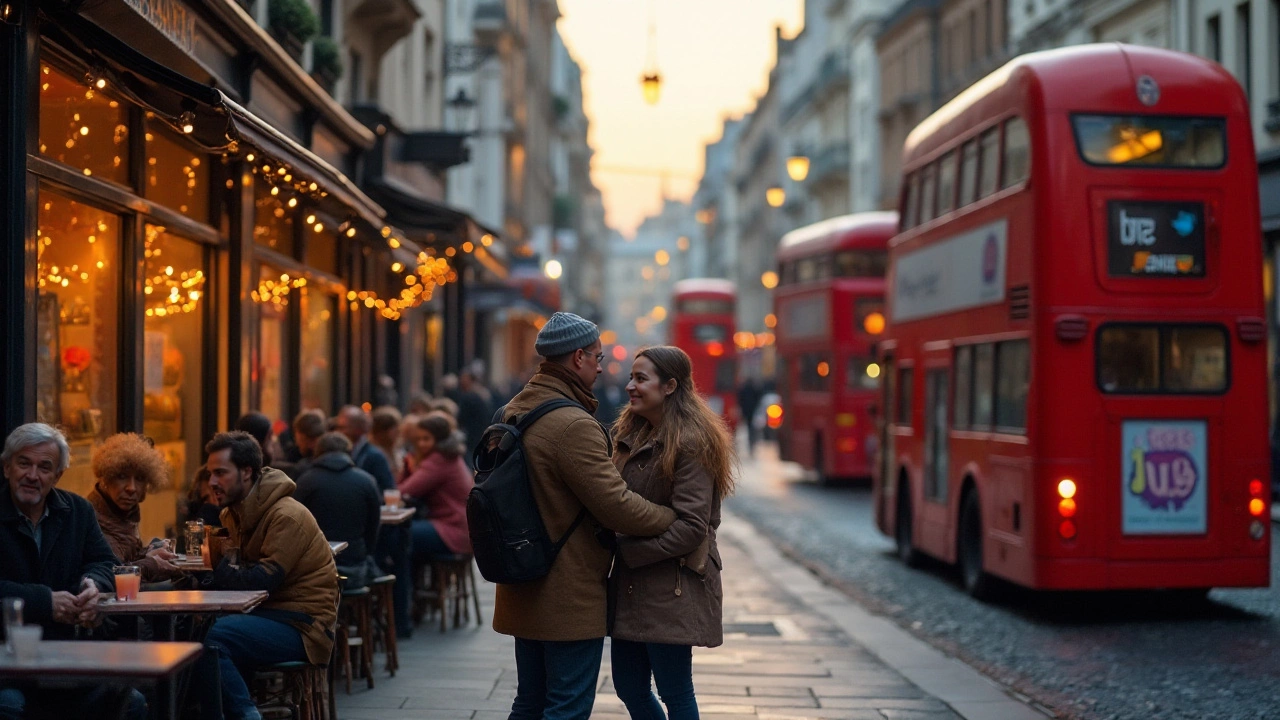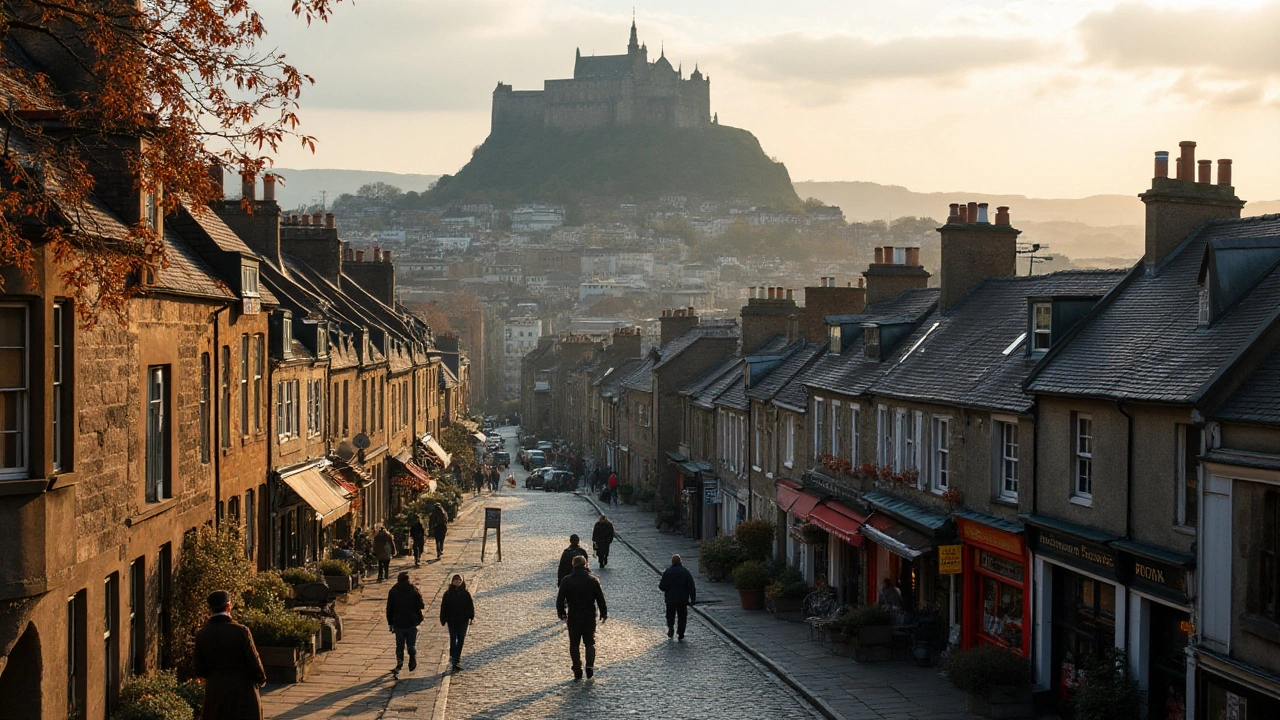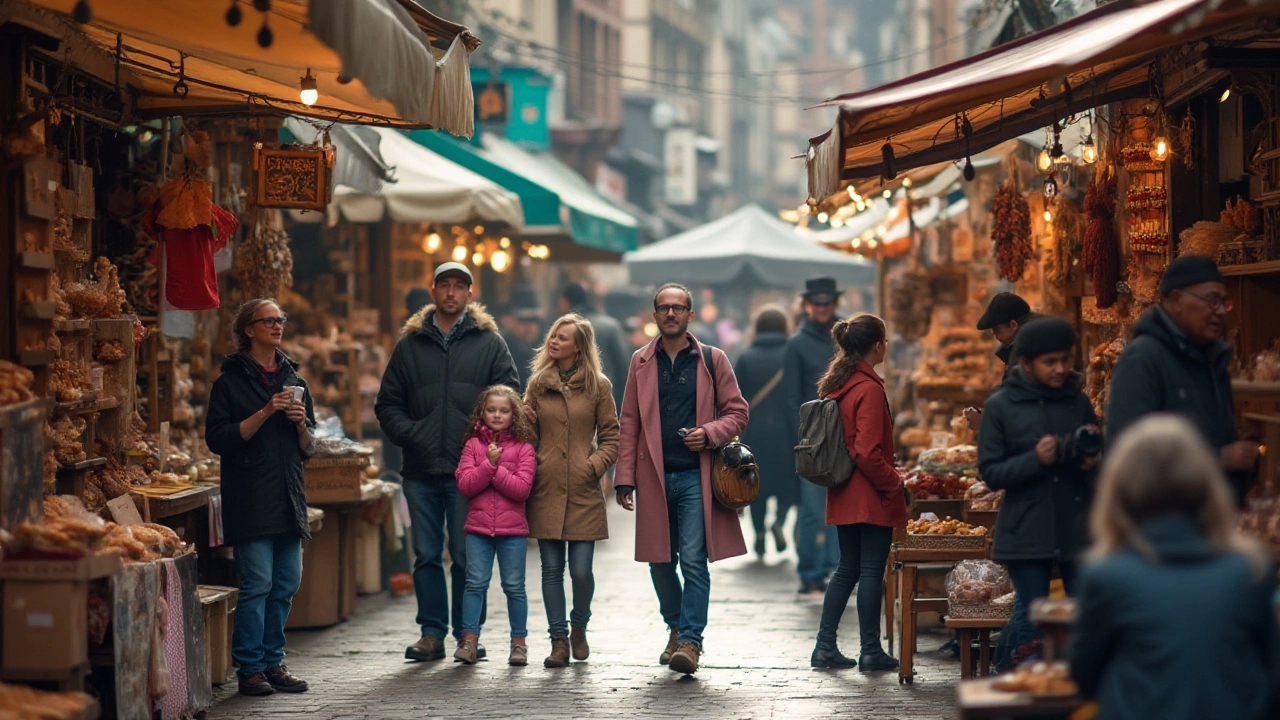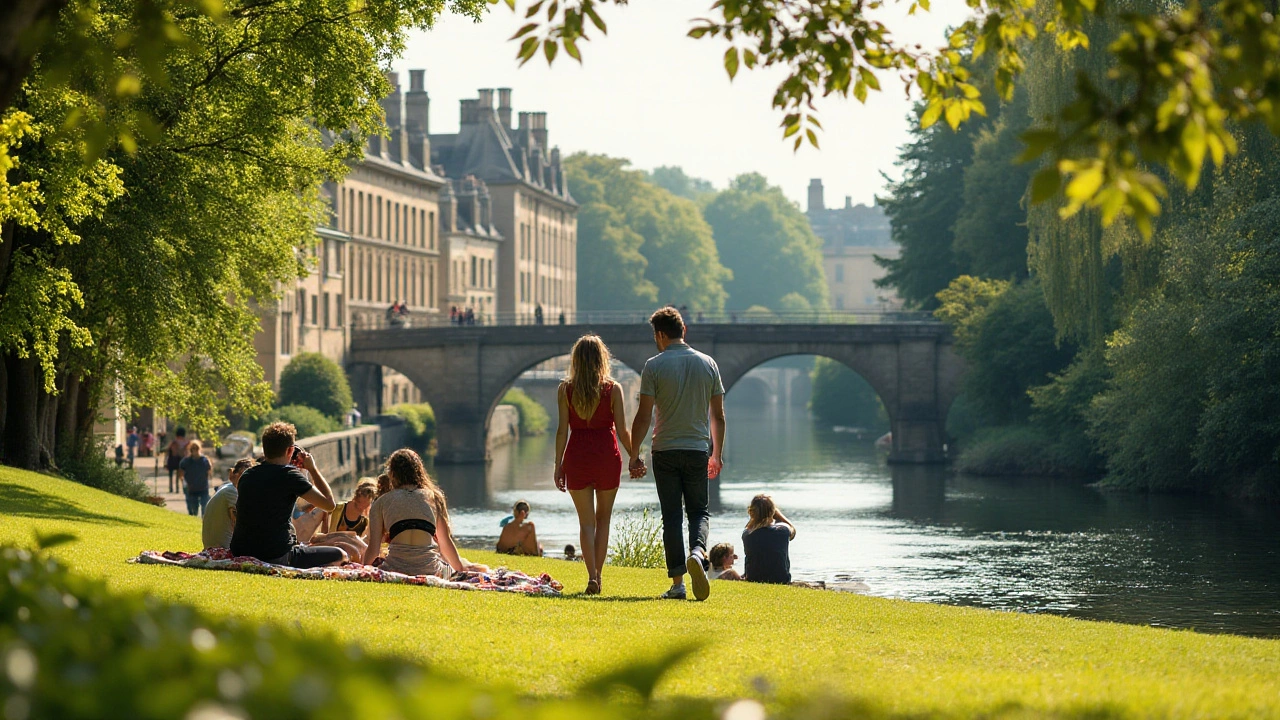Why Are City Breaks Beneficial for Your Happiness and Health
 Jan, 1 2025
Jan, 1 2025
In the fast-paced whirl of modern life, nothing rejuvenates the spirit quite like a quick city break. These getaways, often spontaneous and easy to plan, offer an enticing mix of adventure and relaxation. Whether you're drawn to a city by its historical intrigue, culinary delights, or the allure of its bustling art scene, each short trip seems to open doors to new and unforgettable experiences.
For those in need of a change in scenery, city breaks allow for an escape from routine without the commitment of long vacations. They present an opportunity to dive into another culture, even if just for a weekend. It's in these interludes that many rediscover joy, learning something new about the world—and often about themselves.
- The Joy of Spontaneity
- Cultural Immersion and Learning
- Convenience and Accessibility
- Health Benefits of Urban Exploration
The Joy of Spontaneity
There is an undeniable thrill that accompanies the impromptu decision to pack a bag and escape to a new urban landscape. This urge to explore a city's corners at a moment's notice embodies the very essence of city breaks. Spontaneity breathes life into our routines, bringing with it an invigorating sense of liberation. Imagine waking up on a Saturday morning, the gentle pull of wanderlust guiding your thoughts, and within hours you're sipping an espresso in a cozy café, people-watching in a city square you've only ever seen in magazines. Such are the simple joys that these brief, unplanned trips can provide.
City breaks are not merely an escape; they are a canvas for unexpected adventures and serendipity. When spontaneity reigns, travelers often find themselves stumbling upon hidden bookshops, stumbling into impromptu street performances, or discovering a quaint alleyway restaurant that had no mention in any guidebook. This unpredictability often enriches the adventure, filling each moment with vivid memories waiting to be discovered. Spontaneous getaways often challenge you to step out of your comfort zone, encouraging interaction with locals and helping forge connections that might not occur with a carefully curated itinerary. You are wrapped in the warm embrace of a city, experiencing its pulse and rhythm as a curious explorer.
According to a study published in the Journal of Positive Psychology, unplanned travel can actually boost happiness and mental health. As Dr. Alice Boyes notes, "Spontaneous experiences, particularly those that involve new environments, stimulate the brain and often result in feelings of exhilaration and achievement." There is something undeniably energizing about tackling the unknown, especially in an urban setting where the possibilities are endless. Each turn of a cobbled street offers a fresh perspective, making these experiences deeply rewarding for those willing to let go of rigid plans.
The flexibility of a city break also appeals to modern travelers, who value experiences over possessions and are drawn to the vibrant storytelling that unfolds when spontaneity takes the lead. These short trips often don't require the exhaustive planning of a longer getaway, reducing stress and allowing for a more carefree travel experience. Moreover, with the connectivity of trains and flights reaching more places than ever, embarking on a city break is both an accessible and appealing choice. Budget airlines and last-minute deals make it feasible to book and board on a whim, expanding the scope of urban exploration available to everyone.
This sense of spontaneity nurtures an adventurous spirit and cultivates a lifelong love affair with discovery. Many travelers who pursue such trips often find that their fondest memories are not from ticking off items from a travel itinerary, but from the unexpected encounters and stories that cities whisper in their ears. As we embrace the unpredictability, city breaks become a fine art of weaving stories into the tapestry of our lives. It is here that we find the true joy: not entirely in the destination, but in the journey itself, unshackled and led solely by the heart's whims.

Cultural Immersion and Learning
City breaks are a delightful avenue for indulging in cultural immersion and learning, allowing travelers to explore diverse heritages and traditions in an engaging manner. The beauty of these short trips lies in their capacity to transform our understanding of the world through firsthand experiences. Each city, whether a sprawling metropolis or a quaint municipality, tells a unique story through its architecture, museums, and vibrant local life. Visiting a city's museums and galleries offers a lens into its history and artistic evolution. For instance, visiting the Louvre in Paris or the Prado in Madrid provides insights into European masterpieces, while a trip to the Museum of Modern Art in New York City exposes visitors to contemporary artistic expressions.
Additionally, city markets often serve as cultural microcosms, bustling with energy and providing an authentic taste of the local lifestyle. Wander through the lively streets of Istanbul’s Grand Bazaar or Barcelona's Mercat de Sant Josep de la Boqueria, where the aromas of spices and the chatter of vendors reveal much about each community's character. Participating in such experiences can unconsciously transform a tourist into a temporary local. Among the bustling stalls and lively exchanges, one often encounters language barriers that can make communication feel like an adventure.
Local festivals and events further enhance the appeal of a city break, providing windows into the traditions and local customs that define each place. Whether it's the passionate celebration of Flamenco in Seville or the electrifying atmosphere of the Notting Hill Carnival in London, taking part in these events allows travelers to embrace the vibrant dynamism of urban life. These moments create tangible memories, making the learning immersion not just an educational experience but a soulful exploration that touches the heart.
Engaging with locals enriches the experience further, offering perspectives not found in guidebooks. Having candid conversations over a coffee or a meal opens doors to understanding the societal nuances, challenges, and triumphs of the region.
"To travel is to discover that everyone is wrong about other countries," observed Aldous Huxley, reminding us of the preconceptions that are often shattered through genuine interaction.Each interaction paints a multifaceted picture that deepens our appreciation of global diversity.
For those with an insatiable curiosity, city breaks also provide the opportunity to engage in workshops and short courses. Whether it's learning to cook Italian cuisine in Rome, mastering the art of calligraphy in Tokyo, or picking up salsa dancing in Havana, these activities blend fun with education. They allow travelers to acquire new skills and knowledge in a short timeframe, often serving as a catalyst for lifelong interests. Such enriching endeavors cement not only what is learned but how it was learned, offering a renewed perspective long after the journey has ended.

Convenience and Accessibility
When it comes to planning your next getaway, city breaks consistently rank high as the most convenient form of travel. This convenience stems largely from their accessibility. Many metropolitan destinations are connected through a vast network of airports, railways, and highways, making them reachable even from the remotest corners of the globe. The concept of a quick escape is appealing precisely because of this ease. The notion of leaving your desk on a Friday and wandering cobblestone alleys by Saturday morning is enticing and very achievable.
Major cities, especially in Europe and North America, often house airports efficiently served by budget airlines. This accessibility expands the traveler's options, allowing them to choose a city break that fits within their budget and time constraints. With airlines competing to offer the best deals, it's easier than ever to snag a ticket without breaking the bank. Notably, many cities also offer comprehensive public transport systems, which further boosts accessibility by making it simple to journey from the outskirts to the city center in a matter of minutes.
For some travelers, the perks of accessibility further extend to accommodation options. Cities offer a broad range of places to stay, from luxury hotels to cozy hostels and everything in between, giving visitors the flexibility to match their lodging with their desired experience. With online booking platforms, it’s straightforward to find last-minute deals, making the entire process seamless. Urban short trips benefit greatly from such advancements in technology and infrastructure, simplifying the entire journey from planning to parking your suitcase in your hotel room.
As noted by Lonely Planet, "Cities are like people: each has its own personality and traits that makes it unique." The thrill of urban exploration lies in discovering what makes each city tick, and accessibility is the key that opens the door to these experiences. City breaks allow travelers to plunge into local life swiftly, often experiencing more in a weekend than they might believe possible. This is largely due to the compact nature of many cities, where attractions, eateries, and entertainment venues are often just a stone's throw from one another.
Accessibility doesn't solely refer to physical connectivity; it also encompasses the wealth of information available at our fingertips. With various digital resources, travelers can plan out their days to make the most of their limited time. From online maps to virtual tours, technology grants the modern traveler the ability to embark on informed adventures, ensuring no opportunity is wasted. This synergy of digital tools and real-world access underlines the unique charm of city breaks. They are not just journeys to new places but are explorations that start the moment the idea strikes.

Health Benefits of Urban Exploration
When we talk about the transformative power of urban exploration, it often transcends the simple notion of travel. Delving into city life can have profound positive impacts on one's mental and physical health. For starters, the very act of navigating through the intricate webs of city streets, bustling squares, and tranquil parks not only enhances fitness levels by increasing physical activity but also stimulates the mind with fresh perspectives. Studies have shown that walking briskly for just thirty minutes a day in an urban environment can significantly boost cardiovascular health, reduce the risk of chronic diseases, and even alleviate symptoms of depression and anxiety.
Moreover, the sensory bombardment of sounds, sights, and smells unique to each city can sharpen cognitive functions. Each city break taken offers a boost akin to a jolt of caffeine, galvanizing your senses with its endless variety. From the intricate architecture of European capitals to the neon-lit vibrancy of Asian metropolises, cities are ecosystems rich in stimuli. Engaging with this urban tapestry fosters creativity and reduces mental fatigue by breaking the monotony of daily life. Imagine strolling through the hidden alleyways of Rome, each path leading to unexpected adventures; it's an experience as invigorating for the mind as it is for the body.
On another note, urban exploration can also nurture social well-being. Each city break presents a chance to connect with different cultures, meet new people, and make meaningful interactions. Conversations with locals or fellow travelers can offer fresh insights and broaden your worldview. Such interactions not only bolster emotional health but also cultivate a sense of empathy and understanding, essential traits in our increasingly interconnected world. An oft-quoted study by UCLA found that meaningful social connections are as crucial to health as exercise or nutrition. This aligns with the idea that city breaks, brimming with opportunities for connection, can be tremendously beneficial to our overall well-being.
"Cities have the capability of providing something for everybody, only because, and only when, they are created by everybody." – Jane Jacobs
Urban exploration also encourages curiosity and constant learning, key components for mental agility. Many cities offer free walking tours, museums with diverse exhibits, and cultural festivals year-round, each providing a new perspective on the world. This continuous learning process has been linked to a reduction in cognitive decline as we age, proving just how beneficial these short trips can be. By embracing the unknown and stepping out of your comfort zone, even briefly, you're essentially providing your brain with a gym session that strengthens its resilience and adaptability.
